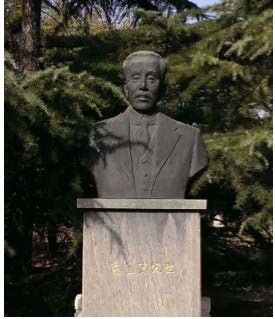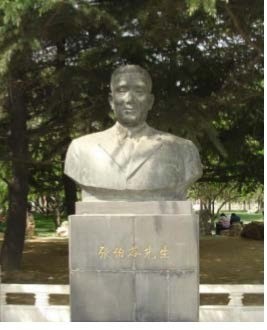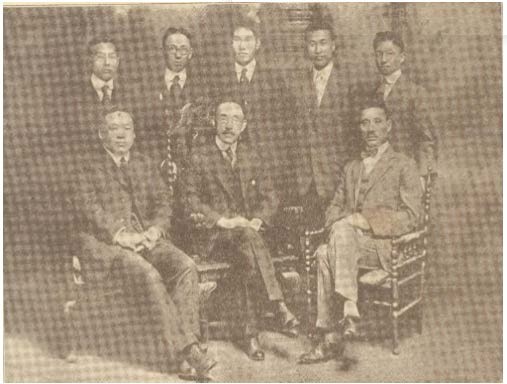Memorial Park of Yan Fansun and Zhang Boling
In the central garden between Mati Lake and Siyuan Hall in Nankai University, the bust bronze statues of the founder Yan Xiu and the first president Zhang Boling are placed there with great respects. For each birthday and anniversary, Nankai teachers, students and alumni will come here and pay tribute to them.

Bust Bronze Statue of the Founder Yan Xiu

Bust Bronze Statue of the First Headmaster ZhangBoling
Yan Xiu (1860-1929), with style name as Fansun, was a famous member of the Imperial Academy of the Qing Dynasty. He once engaged as the editor of the Imperial Academy, Guizhou provincial education commissioner and assistant minister of the national academic department. He was one of the pioneers in the reform of feudal education and the promotion of new education in the modernization of Chinese education. After the defeat of the Sino-Japanese War, Yan Xiu was greatly shaken. He deeply felt that China must be self-reliant and carry forward the reform movements. Then establishing a new education became a necessary step. In 1897, Yan Xiu submitted a written statement to the Emperor Guangxu, and asked for his approval to set up a special subject of economy and reform the imperial examination system. After resigning from office, he returned to his hometown Tianjin and used Yan’s family hall as a base for developing new education. Moreover, he hired Zhang Boling —— a teacher with new school sight for his students.
Zhang Boling (1876-1951), with Shouchun as his given name, who later used his style name, was graduated from the driving class of the fifth phase in Beiyang Naval Academy in October 1895. In the first half of the year, the Qing government was defeated in the Sino-Japanese War and signed the “The Treaty of Shimonoseki” with humiliating terms with Japanese government. One of the terms was to allow Japanese troops to station in Weihaiwei. In July 1898, the Britain occupied Weihaiwei. Zhang Boling sent the officials of Qing Government to conduct the reception and transfer of the procedures by Tongji Steamer, who personally experienced the humiliation of the “three changes of the national flag”: they lowered the sun flag first, then raised the flag of yellow dragon, and changed to the Union flag just after one day. He was filled with grief and indignation, deeply stimulated, and aware that the Navy can’t save China. “The key to self-improvement is education; the creation of new education can create new talent.” Since then, Zhang Boling left Beiyang Naval Academy and devoted himself to education as his lifelong career.
On October 29, 1898, Yan Xiu, 38 years old, hired Zhang Boling, 22 years old, to attend Yan’s family hall to teach English and mathematics, which opened a common cause for joining hands to make a strong country by developing the education. They were severely stimulated by the national disaster and jointly sponsored the vision of saving the nation by education. In 1904, after they visited Japan and returned to China, they merged Yan and Wang's two halls, enrolled new students and formally established a secondary school. Since then, they also jointly opened Nankai University, Nankai Women Middle School and Nankai Primary School respectively in 1919, 1923, and 1928, making Nankai schools take shape.
At the beginning of the establishment of Nankai schools, Yan and Zhang had the idea of setting up a university. Since the initial trial was unsuccessful, they agreed that Zhang Boling first went to the Teachers College, Columbia University to study higher education in 1917. Yan Xiu and Nan Kai’s board directors Fan Yuanlian and others visited the United States in 1918. This study tour made them have a more in-depth understanding of the organization and development of American universities and felt more deeply about the importance of university education to the country. They inspired and immediately prepared to start a university after returning to Tianjin. In order to raise funds for running Nankai University, in early 1919, Yan Xiu, at his 60 years, still run around with Zhang Boling in spite of his physical weakness and the pain of losing the child he had just experienced. They communicated with the military, politics, government, and business circles, claiming to be “old monks beg for alms.” They rushed to raise funds, and they both gained profits and were cold-shouldered from others’ indifference. However, they calmly faced all of these and did not mind at all.

In 1918, Yan Xiu and Zhang Boling took group photos when they were studying in the United States.
(The person in the center of the front row is Yan Xiu
and the first person on the right is Zhang Boling)
Nankai University benefited a lot from Yan Xiu at the initial stage. At the beginning of the school establishment, Yan Xiu gave great support to the school with personal financial resources and material resources. Moreover, several large social donations received by Nankai University at the beginning were also due to his social reputation and personal relationships. Facing the various social doubts to the private Nankai University, Yan Xiu gave Zhang Boling firm support and sincere advice. Zhang Boling said these for many times: “I’m really fortunate to work under Mr. Yan’s guidance; Nankai is really fortunate to be initiated by Mr. Yan.” On March 14, 1929, Yan Xiu died, and Ta Kung Pao published the editorial commentary to mourn his death as “the great misfortune of the academic community” and praised him for his dedication to the development of Nankai. Nankai University held memorial service. Zhang Boling spoke highly of Yan Xiu’s achievements in running schools and respected him as the father of Nankai University.
Yan Xiu’s greatest contribution to Nankai was his selection of a good president for Nankai. Zhang Boling founded Nankai series schools and served as a president for more than 40 years. During the nearly half a century, he has always adhered to the strong belief of saving the nation by education, experienced hardships, planned operations, and devoted himself to education with great persistence. He upheld the philosophy of “four cultivation” of morality, intelligence, sports and aesthetics, and set the school motto as “Dedication to public interests, acquisition of all-round capability, and aspiration for progress with each day”, and cultivated many outstanding talents for thecountry. Zhang Boling’s spirit and achievements in dedication to Nankai and education have been recognized and highly praised both at home and abroad. Thus, he has been hailed as “the creator of modern China’s education” and “a symbol of national self- confidence.”

On October 17th, 1926, Yan Xiu and Zhang Boling took photos
at the inauguration ceremony of Nankai Woman Middle School.
On April 5, 1986, the 110th anniversary of Zhang Boling’s birthday was held in Nankai University. Li Peng, the then vice prime minister of the State Council and Director of the Ministry of Education of the People’s Republic of China, delivered an important speech and spoke highly of Zhang Boling’s patriotism and progress of his life. At the same day, a bust of Zhang Boling was unveiled at the central garden of Nankai University. The bronze statue was designed by Prof. Wang Zhijiang of Tianjin Academy of Fine Arts. It is 1.1 meters high and 1.2 meters wide. This bronze statue is the image of President Zhang Boling when he founded the Nankai school. He was dressed in a suit with a smile and his eyes were sparkling as if he was watching the development of Nankai. Following Zhang Boling’s unfulfilled wish, the ashes of him and his wife were also buried here.
On October 17th, 1992, Nankai University placed the bust bronze statue of Yan Xiu with great respects, the father of the school, on the east side of the central garden. He stood shoulder to shoulder with the statue of president Zhang Boling and echoed with him. The back of the statue base is engraved with a 352-word inscription, which briefly describes the performance of Yan Xiu’s life. On April 2, 2010, Nankai University held a grand ceremony to commemorate the 150th anniversary of the birth of Yan Fansun. Xue Jinwen, Party Secretary of Nankai University, represented the school and deeply cherished the memory of the important contribution made by Yan Xiu to the modern Chinese cultural education. He pointed out that Mr. Yan Fansun had devoted his life to the creation and funds raising of Nankai schools, especially Nankai University; he has profoundly influenced the development of early Nankai with his own patriotism and educational concepts, and promoted Nankai to form an excellent educational tradition. All these are critical and decisive for the Nankai education. It is in this sense that Nankai won’t exist without Yan Fansun. Mr. Yan Fansun is definitely the well-deserved “Father of Nankai”.









